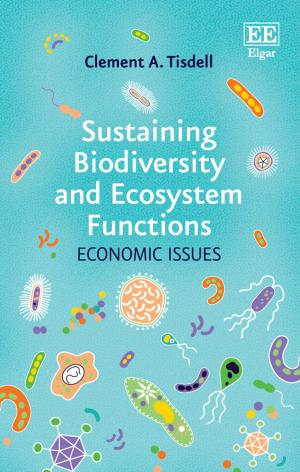Sustainability Science for Strong Sustainability
Business & Finance, Economics, Sustainable Development, Nonfiction, Science & Nature, Nature| Author: | Dedeurwaerdere, T. | ISBN: | 9781783474561 |
| Publisher: | Edward Elgar Publishing | Publication: | December 15, 2009 |
| Imprint: | Language: | English |
| Author: | Dedeurwaerdere, T. |
| ISBN: | 9781783474561 |
| Publisher: | Edward Elgar Publishing |
| Publication: | December 15, 2009 |
| Imprint: | |
| Language: | English |
The dynamism of science has been catalytic for human prosperity in recent history. Conventional perspectives of the ivory tower model of modern science are, however, rivalled by the failure of humanity to tackle global crises of an economic, environmental and social nature. Operational solutions to these pressures have grown and exposed the pitfalls of modern science to date.Research institutions globally are eschewing traditional practice, converging around ideas of transdisciplinary sustainability science. New practice based on science-society research partnerships, experiential learning in higher education and iterative and participatory modelling has become manifest. Sustainability Science for Strong Sustainability investigates the core concepts, tools and institutional strategies of this evolving field. Prominent research programs within heterodox economics, the environmental sciences and transition theory are explored through diverse case studies, revealing challenges and advancements for transdisciplinary research. The need for reform of modern science is facilitated by consideration of action points to overcome the institutional barriers of putting sustainability science into practice.Up to date knowledge on the practice of transdisciplinary research for sustainability will benefit researchers in environmental economics and environmental management. Senior policy officials active in research policy and environmental planning will find the book’s analysis invaluable to their practice. Uniquely offering a broad review of transdisciplinary sustainability research, this book is constructive supplementary reading for post-graduate teaching.
The dynamism of science has been catalytic for human prosperity in recent history. Conventional perspectives of the ivory tower model of modern science are, however, rivalled by the failure of humanity to tackle global crises of an economic, environmental and social nature. Operational solutions to these pressures have grown and exposed the pitfalls of modern science to date.Research institutions globally are eschewing traditional practice, converging around ideas of transdisciplinary sustainability science. New practice based on science-society research partnerships, experiential learning in higher education and iterative and participatory modelling has become manifest. Sustainability Science for Strong Sustainability investigates the core concepts, tools and institutional strategies of this evolving field. Prominent research programs within heterodox economics, the environmental sciences and transition theory are explored through diverse case studies, revealing challenges and advancements for transdisciplinary research. The need for reform of modern science is facilitated by consideration of action points to overcome the institutional barriers of putting sustainability science into practice.Up to date knowledge on the practice of transdisciplinary research for sustainability will benefit researchers in environmental economics and environmental management. Senior policy officials active in research policy and environmental planning will find the book’s analysis invaluable to their practice. Uniquely offering a broad review of transdisciplinary sustainability research, this book is constructive supplementary reading for post-graduate teaching.















